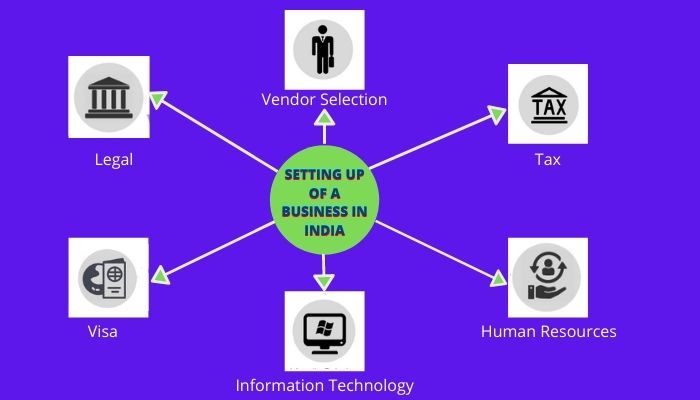Earlier setting up of business in India was very challenging due to a lot of multi compliances like separate registration for service tax, sales tax, excise but now it becomes quite easy. In this article, we will understand how a foreign company or entity may start a business in India. So before you start this article explains the procedure to set up business in India from a Foreign company or any other foreign business entity. So let’s understand how as a foreign company or a small business outside India you can set up your business in India, to extend their products & services in India in many ways.
We have seen that Corona has created havoc in the world’s economies, Although, this may also bring an opportunity for you to start or expand your business in India especially afterworld is delinking with producer tuned aggressor China.

However before we tell how to set up Business in India, Its most important to know why to set up Business in India. A few of Silver lines are mentioned herewith:-
- Large & Fastest Developing Economy in the world
- Great Logistics & Maritime Potential
- Greatest Jump in ease of doing business
- Large Consumption Base of 1.3 Bn
- Massive Investment in Physical and Digital Infrastructure
- Historic Tax Reforms (Lowest Corporate tax base)
- Business-friendly & Stable Government policies
- Abundant Natural Resources
- Youngest & Dynamic Work-Force
- High Technology Adoption Rates
- Focus on Sustainability and Environment Conservation
So if you want to start a business in India then you can start various forms and entities Before you decide the form, you have to consider many aspects like regulatory requirements or infrastructure facility or finance source, etc.
You can start a business in any of the following forms:
Company (Public or Private)
Limited liability partnership (LLP)
Joint venture company
Foreign Institutional investor
Liaison Office (Representational Office)
Branch Office
The following are some factors which may help you to decide the form of business start in India
Nature: The nature of the business is one of the most crucial factors for foreign entities to choose the form in which they should set up the business in India. If you already have a business in your home country then you may start a business as a branch office in India.
The volume of operations: This also an important factor for deciding the form. If the volume of operations is large then it is always advisable to start your business by creating a company. Although if you want to invest for a shorter period then you can use other forms.
Capital investment: In the case of a branch office or liaison office, you would not need much capital however if you want to invest a larger amount then you should start with the company.
Minimum Number of directors
If you want to set up the business by creating a private company then there would be a requirement of 2 individuals and an Indian address. Why 2 individuals because for a private company there should be at least 2 directors and 2 shareholders of the company. Also out of 2 directors, there should be at least one director who is an Indian citizen i.e. who resides in India for more than 182 days in the previous financial year.
Following are some basic recruitment which you have to be fulfilled before starting a business as per the business type
| Particulars | Private | Public | One Person Company | Limited Liability Partnership |
| Min Members | 2 | 7 | 1 | 2 Partners |
| Max Member | 200 | Unlimited | 1 | No Limit |
| Min Directors | 2 | 3 | 1 | 2 Designated Partner |
| Max Directors | 15 | 15 | 15 | NA |
| Resident Director | 1 Mandatory | 1 Mandatory | 1 Mandatory | 1 Designated Partner |
Although, if you want to appoint more than 15 directors then you have to pass a special resolution for this.
Friends, one point needs to be noted here that whether you start as a company or open a branch office, your audit as per Indian law is compulsory which means you have to prepare separate books of accounts in respect of your Indian operations.
Now, let me briefly explain to you about the things that you need to take care of in case you want to start as a private limited company of Wholly Owned subsidiary of a Foreign company:
Ø Name Availability on MCA Portal: The name of the company should be unique
Ø Acquiring DIN (Director Identification Number): The subscriber of the company becomes the first director and each director is required to have a DIN.
Ø DSC (Digital certificate): It’s a kind of electronic key that authenticates the document which you would have to send to different authorities.
Ø Creating a common seal: As we know the company is a separate identity and its signature is called a common seal.
Ø Acquiring Permanent Account Number (PAN), GST registration number, TAN number, PF and ESI registration number
Mostly non-residents set up their business and then export it in their home countries or any other country. In the case of export also, the government has given many benefits in many terms.
Under Income Tax: If you set up a business in SEZ (Special Economic Zone), It’s a particular area in which all the businesses are set up only for export and not for domestic sales. For them, they will get the deduction under section 10AA.
Under Goods and Service Tax: If you purchased inputs and after manufacturing export the output then you will be eligible to claim the refund of GST which you have paid on the inputs purchased. So, the burden of GST would not be imposed on the customer and it will attract the customer outside the country.
Foreign Trade Policy (FTP): If you are in the business of exporting goods or services or about to start a business then it is necessary to understand the Foreign Trade Policy (FTP). It provides many benefits for exporters.
Our government is making all its efforts for the ease of doing business. Whether in direct Tax or Indirect tax, if you encounter any doubt then you may file an application to advance ruling authority set up as per the respective law. For example, if you want to know about the TDS applicability then you may file an application under section 245N of the income tax act, 1961. Similarly, if you have a doubt related to GST then you may file an application under section 96 of the CGST Act, 2017.
Indian government always promotes foreign investment. It might be possible that some of you just want to invest in the Indian stock market rather than starting a business as a trader or manufacturer or service provider. For them, earlier they had to first convert the foreign currency into Indian currency and then invest in the Indian stock exchange. If on any gain, first STT was charged then on the remaining amount income tax was charged, and then NRI took the rest of the amount to his home country only after again converting it to the foreign currency. Hence no small investor would be able to invest in India.
However in 2017, to promote foreign investment, in Gujrat, the first international foreign service center (IFSC) has been developed). This is similar to the stock market but here the foreign investor can invest in Foreign currency and similarly when they sell the shares, they will get the consideration in foreign currency. Hence, the fluctuation of currency would not arise here.
Secondly, here in the trading of securities, no Security transaction tax is being charged. Hence, no need to pay any charge.
Lastly, on short term capital gain, Non-residents would have to pay tax @ 15% and 10% on long term capital gain.
Also, if you lend the money to any unit located in such IFSC, then the interest income on such amount shall be exempted subject to the condition that money was borrowed on or after 01.09.2019.
Friends I hope, now you will get the idea of procedure and benefits for setting up the business in India and If you want us to elaborate any point or more benefits for setting up the business in India then you may call or WhatsApp any time. We will be happy to serve you.


